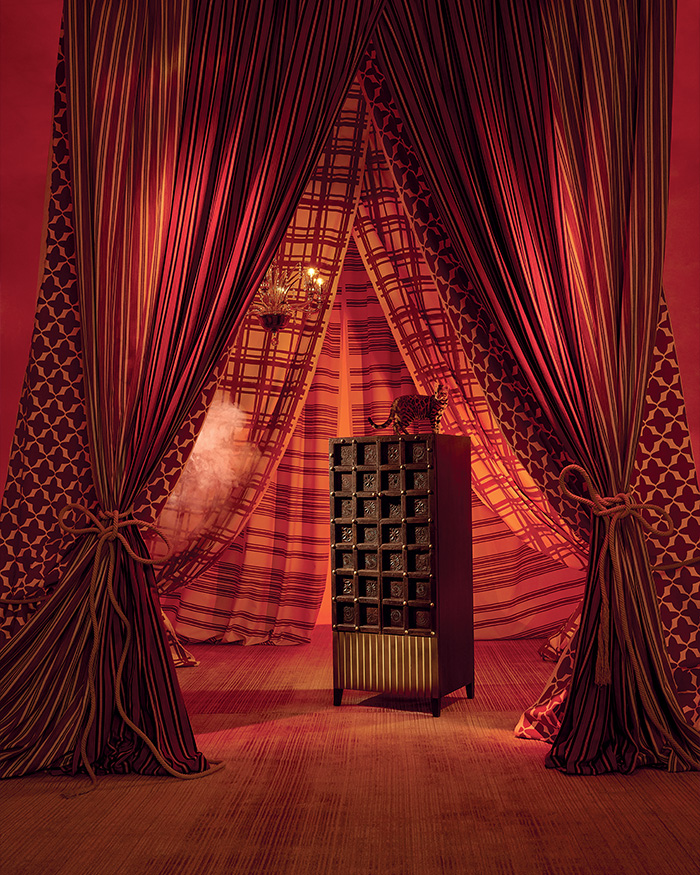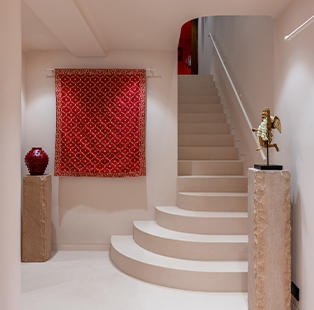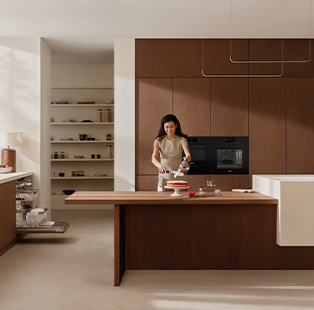The joys of a finely brewed cup of tea were a lesson I vividly recall from the sepia-tinged memories of my childhood. And yet, it was the sight of a wooden Makaibari chestlet kept on a shelf at our Binnaguri home that sparked my 12-year-old self’s curiosity. My fragrant subject of fascination? Darjeeling tea leaves in a pinewood box, sporting the more than a century-old tea estate’s name in a verdant shade of green.
It is this very hue, as if plucked straight from a tea bush, that wraps the interiors of Makaibari’s newest outpost. Brewing within Taj Bengal, Kolkata, is an amalgamation of vintage-inspired furniture, carpets no less than a work of art and a mind-boggling variety of tea in canisters. Touch, and you’ll be surprised to find that they spin — a fun feature inspired by Buddhist prayer wheels! Dubbed the Makaibari Bungalow, the 1,527 sq ft store has been crafted by Pallavi Nopany and Angelique Dhama.


Plucking history
Evocative of a planter’s bungalow, the store urges you to stop and smell the tea on your way. The interiors resemble a picturesque getaway, replete with a faux fireplace, plush seating and the Himalayan foothills illustrated on the walls of a make-believe balcony. Akin to canvases of art draped on the floor, handwoven carpets by OBEETEE occupy pride of place amidst the interiors. Kalighat paintings by Anwar Chitrakaar adorn the walls, while the glint of 19th-century inspired silverware and plantation furniture beckon one to pause and admire.


If you’re stumped by the wide variety of tea choices at hand, here’s a recommendation. Rudra Chatterjee, the chairperson of Makaibaari’s parent company Luxmi Tea, shares, “The Silver Tips Imperial by Makaibari — it is the best cup of tea I’ve ever had and I luckily get to have it every day!”
Down the tea trails
The store aims to whisk you away to the tea-laden hills of Makaibari. Behold a spirited interpretation cast in lush greens, warm walnut wood accents and glinting brass. Wooden French doors welcome one at the onset, tantalising curious onlookers with glimpses of the rich tactile space. As the tea canisters beckon one to spin, twist open and breathe in the fragrant smell of their blends, plush plantation-inspired furniture with soft curves lay around the store.


A faux green fireplace emblazoned with the year of the Makaibari tea estate’s founding (1859, for those who’re curious) decorates the space, crowned by one of many Kalighat paintings hanging around the store. Curios from Luxmi’s yesteryears can be spotted on the tables — from accounting books dating back centuries to black-and-white pictures of those who’ve steered the company’s history. Handwoven carpets crafted by artisans at OBEETEE hang off a sleek metal rack.


Hungry? The lush dining spread showcases a varied array of tea accompaniments, inviting exploration. Vintage-inspired silverware, porcelain cups and earthy terracotta-hued teapots supplement tin caddies of Makaibari and Luxmi tea side-by-side. Walk over past another set of French doors within for a glimpse of the Himalayan foothills on the walls, crowned by white wall mouldings. The imagined balcony area features a bar-like counter serving cups of tea. Visitors are invited to pull a chair from the dining setup in the space, sipping on tea amidst the sweeping view illustrated on the wall.
Brewing a legacy
Makaibari’s origins trace their roots to pre-independence India when British traditions had seeped into the common layman’s day-to-day life. It is an ode to a period of major cultural shifts, frozen in time for one to peruse through at their own leisure — all with a cup of tea in hand!


The space showcases tea not just as a beverage, but as a mindful experience. As Rudra explains, “What used to be a nuisance, brewing tea, is now a ritual. What used to be a challenge is now heritage you want to pass on.” Representing this shift in mindset, the interiors supplement the tea’s time-worn, rich legacy.

















